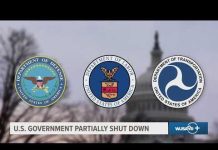
The legal debate over the 14th Amendment’s birthright citizenship clause intensifies as challenges are brought against President Donald Trump’s executive order.
Key Takeaways
- Legal experts debate the interpretation of the 14th Amendment’s birthright citizenship clause.
- President Trump’s executive order aims to end birthright citizenship for children of undocumented immigrants
- Numerous lawsuits challenge the executive order, with a judge in Maryland recently granting a preliminary injunction against the order and another in Seattle blocking it as well.
- The legal battle highlights differing interpretations of constitutional law in the U.S.
Legal Experts and Interpretation of the 14th Amendment
Legal debate surrounds the 14th Amendment, particularly its birthright citizenship provision. While traditionally interpreted as granting citizenship to anyone born in the U.S., this view is now contested. Legal experts argue over the phrase “subject to the jurisdiction thereof,” which some believe could necessitate more than being born on U.S. soil to gain citizenship. The Trump administration’s challenge to the long-standing interpretation has ignited legal scrutiny and disagreements among scholars.
President Trump issued an executive order seeking to end birthright citizenship for children of undocumented immigrants. This executive action emphasizes the “subject to the jurisdiction thereof” clause, asserting that U.S. citizenship should not be automatically conferred on these children. The Department of Justice supports this view, arguing that the Constitution does not intend for citizenship to extend to children of individuals who bypass or contravene federal immigration laws.
Judge issues nationwide injunction blocking Trump’s bid to end birthright citizenship – ABC News https://t.co/i0TVTgEyVY
— Gerald A. Griggs (@AttorneyGriggs) February 5, 2025
Legal Challenges to Trump’s Executive Order
Trump’s executive order has sparked multiple lawsuits. Legal actions, including those filed by attorneys general from 22 states and organizations like the ACLU, assert that birthright citizenship is settled law. The executive order is challenged on grounds that it unlawfully aims to rewrite constitutional mandates with a stroke of a pen. Despite legal challenges, the White House remains resolute in defending the order, framing the lawsuits as political resistance.
U.S. District Judge John Coughenour temporarily blocked the executive order last month, paving the way for U.S. District Judge Deborah Boardman to issue a nationwide preliminary injunction this past Wednesday. Boardman made this ruling following a request from the legal team of a group of pregnant undocumented women, arguing that “The denial of the precious right to citizenship will cause irreparable harm.”
Coughenour also issued a ruling in Washington state on Thursday, calling birthright citizenship an “unequivocal Constitutional right” and blocking Trump’s order.
This ongoing legal confrontation highlights discrepancies in interpreting constitutional laws and anticipates the potential for a Supreme Court decision to clarify birthright citizenship under federal jurisdiction.
Some members of the legal community remain divided, with some arguing that birthright citizenship has been wrongfully extended beyond the founders’ intent. The ongoing legal confrontations are not just courtroom battles, but pivotal junctures in shaping America’s identity, citizenship laws, and constitutional interpretation. The controversy over birthright citizenship could lead to a Supreme Court ruling on the 14th Amendment’s interpretation.
Sources
- Birthright Citizenship: The Legal Debate Heats Up
- Judge issues nationwide injunction blocking Trump’s bid to end birthright citizenship
- 22 states sue to stop Trump’s order blocking birthright citizenship













